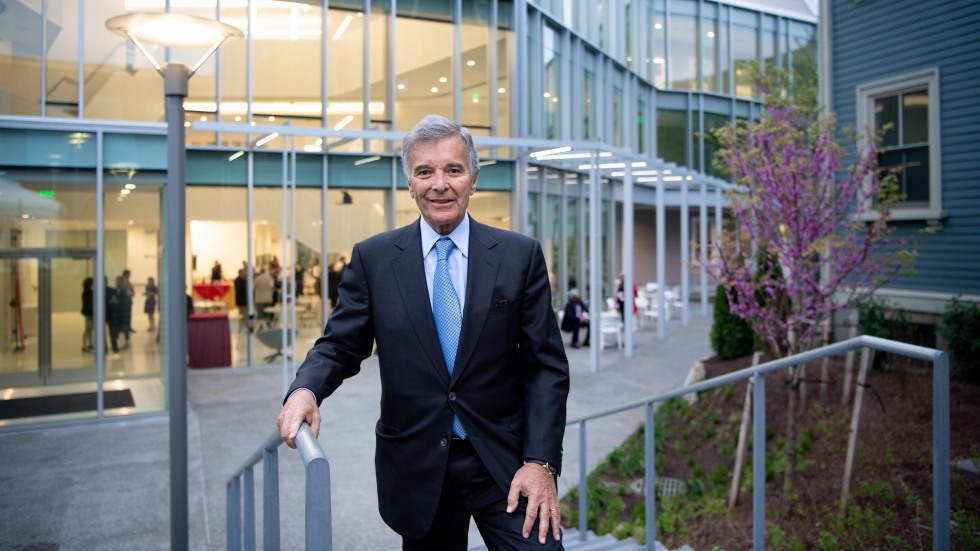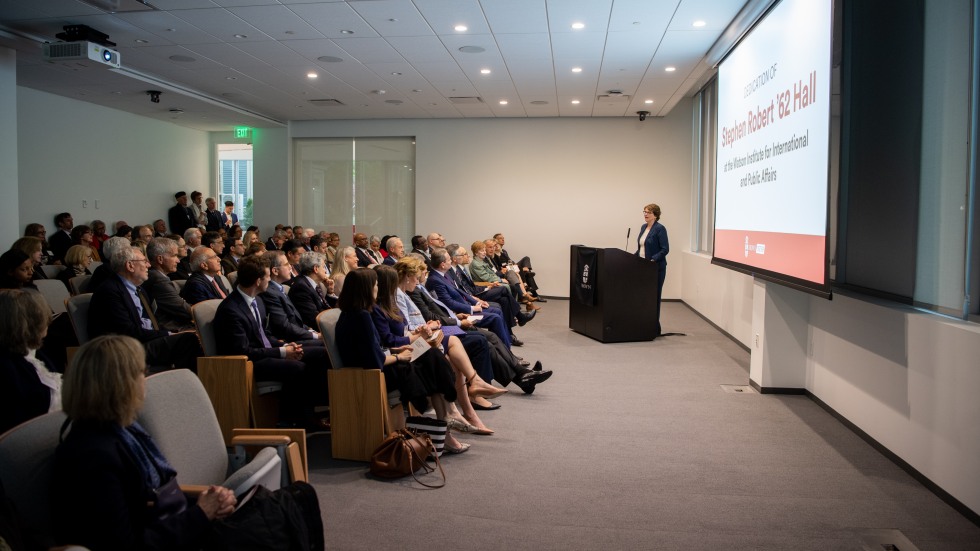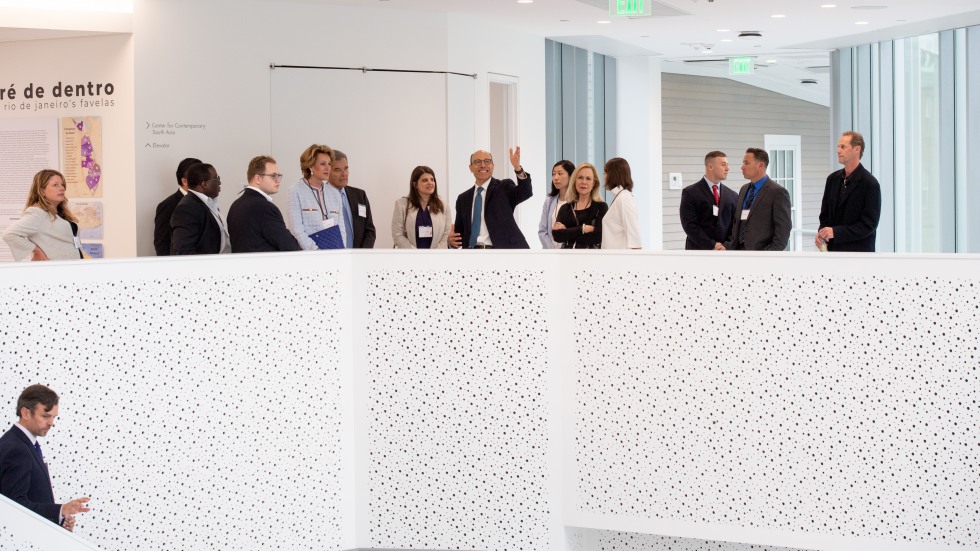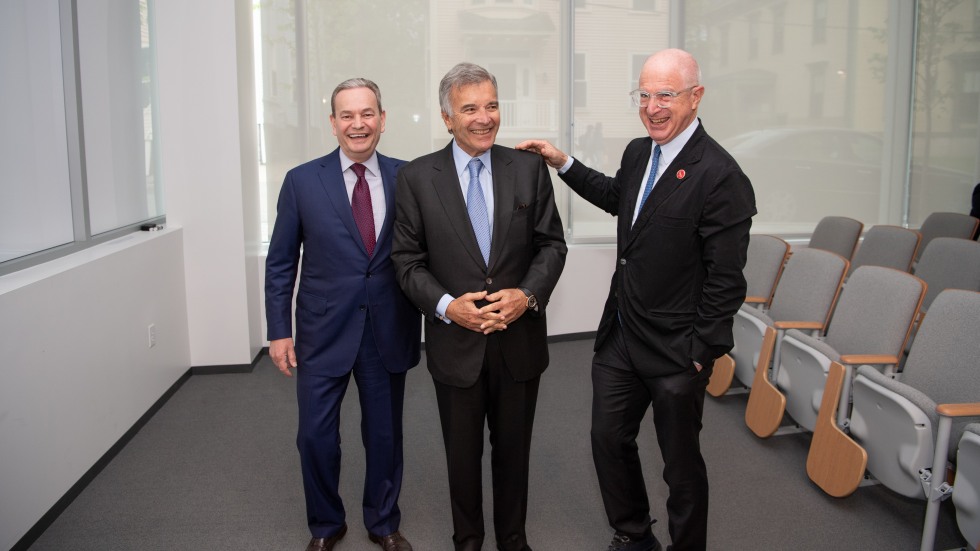PROVIDENCE, R.I. [Brown University] — On Thursday, May 23, as thousands of Brown University alumni and family members began to descend on College Hill to celebrate Commencement and Reunion Weekend, University leaders and community members gathered to dedicate Stephen Robert ’62 Hall, among the newest additions to Brown’s campus.
The sleek, state-of-the-art building, which opened its doors in December 2018, expands the physical footprint of Brown’s growing Watson Institute for International and Public Affairs, adding 23,000 square feet of faculty office space, classrooms, study areas and event venues.
“Watson has become the hub for all things to do with public and international affairs and policy for the entire University,” Brown President Christina Paxson said at the dedication event. “And the way that Watson is collaborating with other great, growing academic units at Brown is terrific. We couldn’t do what we’re doing without this space.”
Since the glass-paneled building opened, it has quickly become a favorite study spot among students and a prime gathering place for members of the Brown and Providence communities. Its large first-floor conference room has hosted film screenings, international conferences and discussions with the likes of former World Bank leader Jim Yong Kim, Democratic National Committee chair Tom Perez and former Republican National Committee chair Michael Steele. And thanks in part to the recently opened Anne’s Cafe on the first floor, its “agora” — a multilevel, light-filled common space — has attracted a steady stream of daytime visitors, from students collaborating on projects to faculty looking for impromptu meeting spots.
University Provost Richard M. Locke said that the new building, connected by a glass pedestrian bridge to the Watson Institute’s adjacent home base at 111 Thayer St., is enabling the institute to create an increasingly robust, inclusive and integrative community of scholars addressing global policy challenges.
“At a time when there is so little measured, fact-based discussion and debate about important issues of the day, Watson provides that forum,” said Locke, who is also a professor of political science and international affairs and the former director of the Watson Institute. “It provides that safe harbor. It provides the ‘agora’ so that we can actually have these kinds of discussions.”
Over the last six years, Locke noted, the Watson Institute has seen unprecedented growth and implemented key changes. The institute has hired new faculty members and increased the number of affiliated faculty from across the University, integrated the Taubman Center for American Politics and Policy, reformed its undergraduate curriculum to create a new international and public affairs concentration, forged new external partnerships, reinvented the master’s in public affairs program, and reinvigorated its regional studies programs, among other accomplishments.
Helping to fuel that expansion, and the construction of Stephen Robert Hall, was a $50 million gift made in 2015 by a consortium of long-time Watson Institute supporters. The group includes Brown alumnus and chancellor emeritus Stephen Robert, the building’s namesake; Alice and Thomas Tisch; and the Thomas J. and Olive C. Watson Jr. Foundation.
At the official dedication, Chancellor Samuel Mencoff thanked that “bold group” of supporters, noting that it was due in part to their support that the Watson Institute is now one of the fastest-growing academic hubs at Brown today.
Designed by architect Toshiko Mori, Stephen Robert Hall sits at 280 Brook St., just across Starr Plaza from two other buildings inhabited by the Watson Institute, including 111 Thayer and a smaller building at 59 Charlesfield St. Edward Steinfeld, the institute’s director, said the fact that the Watson Institute now occupies nearly an entire square block on College Hill is a testament to its growing influence on campus — and to the fast-paced positive change it has undergone in recent years.
“There’s so much change embodied in this phenomenally open and artistically beautiful space,” Steinfeld said. “But in a very fundamental way, something hasn’t changed, and that’s our commitment to the vision that Howard Swearer and Tom Watson laid out almost 30 years ago. To put it differently, we remain absolutely committed to the realization of a more peaceful and just world. We remain absolutely committed not just to the idea, but the reality of the university as a center for global knowledge and learning. And we remain absolutely committed to the idea of service.”




